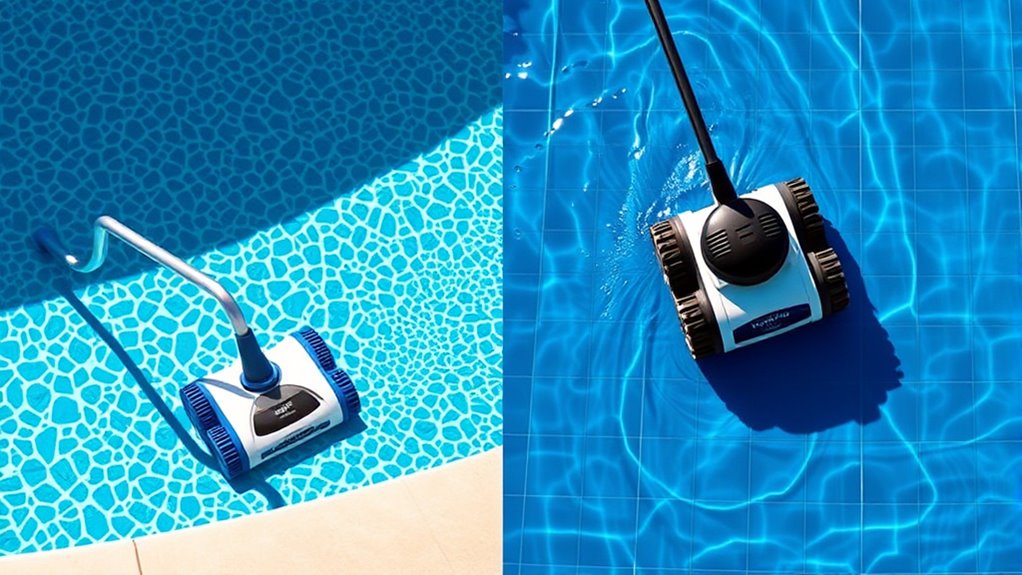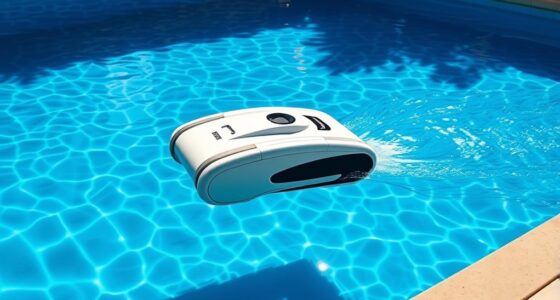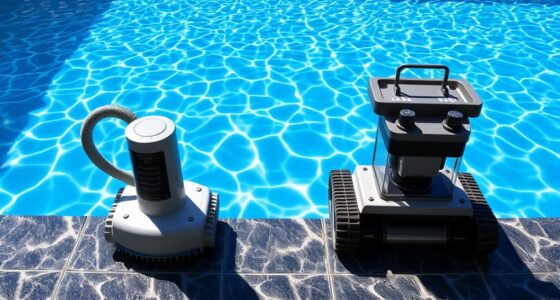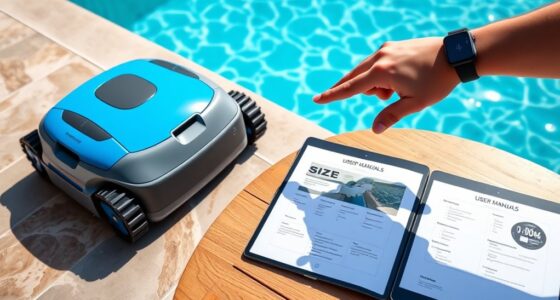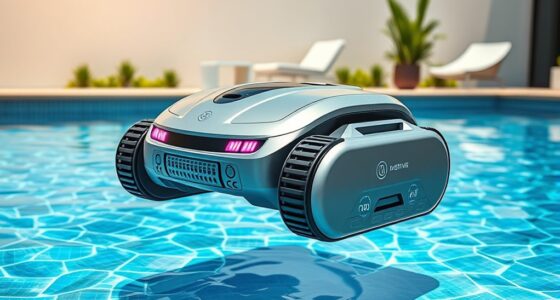Using suction pool cleaners in above-ground vs in-ground pools varies mainly in setup, compatibility, and maintenance. Above-ground pools often require adapters and have simpler installation, while in-ground pools need more robust equipment and may face higher repair costs. Both types effectively remove debris when properly maintained, but in-ground pools usually demand higher suction power and upkeep. To maximize your cleaner’s performance and lifespan, understanding these differences is key—there’s more to contemplate if you continue exploring.
Key Takeaways
- Suction pool cleaners connect to skimmers or dedicated suction lines, suitable for both in-ground and above-ground pools with proper adapters.
- In-ground pools generally require larger, more powerful cleaners due to bigger surface areas and complex shapes.
- Above-ground pools benefit from lightweight, easy-to-install cleaners with lower suction capacity suited for smaller pools.
- Maintenance and filter upkeep are essential across both pool types to ensure optimal cleaner performance and longevity.
- Compatibility depends on pool size and filtration system capacity, influencing cleaning efficiency and equipment lifespan.
How Suction Pool Cleaners Operate in Different Pool Types
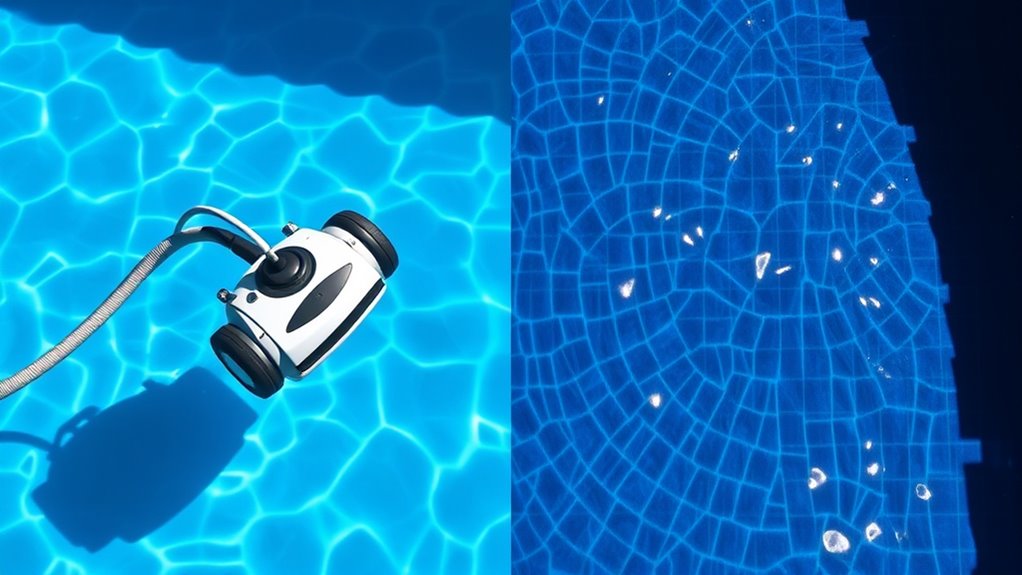
Suction pool cleaners work differently depending on the type of pool you have. In in-ground pools, they connect directly to the pool’s skimmer or dedicated suction line, using the existing pool filtration system to power debris removal. This setup allows them to move smoothly along the pool floor and walls, effectively cleaning out dirt, leaves, and small debris. Proper maintenance of the pool filtration system enhances their efficiency and prolongs the cleaner’s lifespan. Regular inspection of the pool’s suction lines can prevent clogs and ensure optimal performance. For above-ground pools, the process is similar, but you might need adapters or specific hoses to guarantee proper suction. The cleaner relies on the pool’s filtration system to create the suction needed for debris removal. Because of this, the efficiency of cleaning depends on the pool’s filtration capacity and maintenance. Proper filtration ensures effective debris removal, keeping your pool clean and clear with minimal effort. Additionally, understanding the role of contrast ratio in a projector can help you choose equipment that provides clear, sharp images, enhancing your overall poolside viewing experience. Efficient filter operation is essential for maintaining optimal suction and ensuring your cleaner performs effectively.
Compatibility and Installation Considerations for Above-Ground Pools
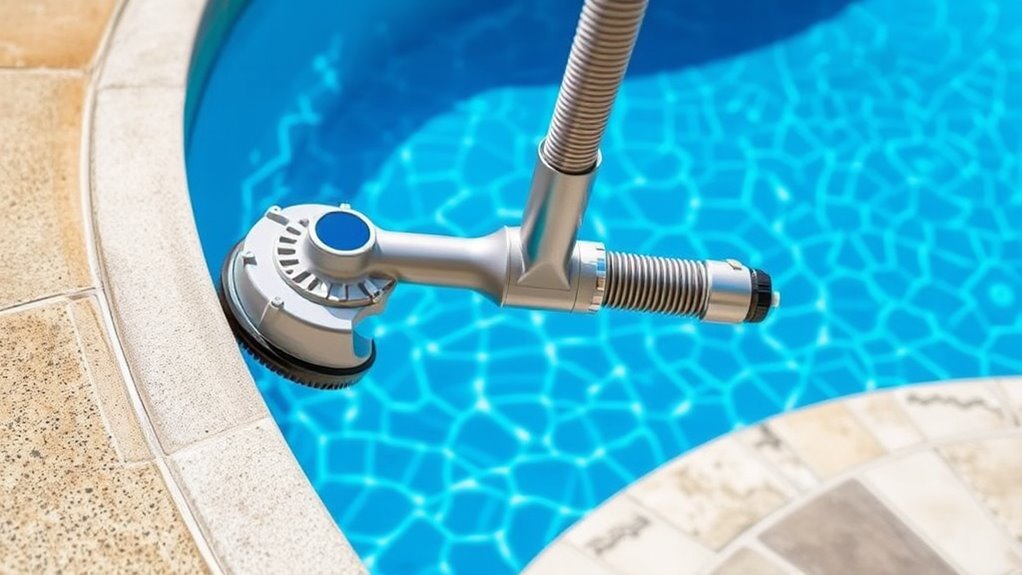
When choosing a suction pool cleaner for your above-ground pool, you need to consider its size to guarantee compatibility. Installation requirements can vary, so it’s important to follow the manufacturer’s instructions carefully. Making sure your pool meets these criteria will help your cleaner work effectively without issues. Proper pool maintenance benefits can inspire you to create a more efficient and comfortable poolside environment. Additionally, understanding security routines can extend the lifespan of your pool equipment and enhance your overall swimming experience. Being aware of product compatibility ensures that your cleaning system operates smoothly and efficiently over time. Recognizing the importance of tableware in social gatherings can also remind you of the value of well-maintained equipment and accessories around your pool area.
Pool Size Compatibility
Choosing the right suction pool cleaner depends heavily on your above-ground pool’s size. If your pool is smaller, you’ll want a cleaner with a lower suction capacity to avoid overwhelming the system. Larger pools require a cleaner with greater suction capacity to handle the increased surface area efficiently. It’s crucial to match the pool size with the cleaner’s suction power to guarantee thorough cleaning without overtaxing your pump. Using a cleaner with inadequate suction capacity for a bigger pool may result in poor debris pickup or incomplete coverage. Conversely, choosing a cleaner with excessive suction for a small pool can cause unnecessary strain on your equipment. Always check the manufacturer’s recommendations for pool size compatibility to guarantee maximum performance and longevity of your cleaner. Recognizing recurring patterns in pool maintenance signs can also help you select the most suitable cleaner for your specific needs, especially as equipment performance can decline if not properly matched. Additionally, understanding proper installation techniques can prevent common issues related to suction inefficiency and ensure optimal operation.
Installation Requirements
Selecting a suction pool cleaner that fits your above-ground pool involves understanding its compatibility and installation requirements. Confirm your pool’s chemical balance is properly maintained, as imbalanced water can affect cleaner performance and damage components. Check that your pool has adequate water circulation; strong circulation helps debris move toward the cleaner’s intake. Installation typically requires a compatible skimmer or dedicated suction port—verify your pool’s setup supports this. Some cleaners need adapters or specific hose lengths to fit securely. Make sure the pool’s pump has enough power to operate the cleaner effectively without compromising circulation. Proper installation minimizes issues like clogging or ineffective cleaning. Maintaining optimal water quality and staying updated on advancements in AI detection methods can help ensure your suction cleaner works efficiently and prolongs its lifespan. Additionally, ensuring that your pool’s circulation system is well-maintained can improve debris removal efficiency and cleaner performance, leading to more effective and lasting cleaning results. Regularly inspecting and cleaning your pool’s filtration system can further enhance overall cleaning efficiency and prevent potential clogs.
Effectiveness in Cleaning Various Debris and Pool Surfaces
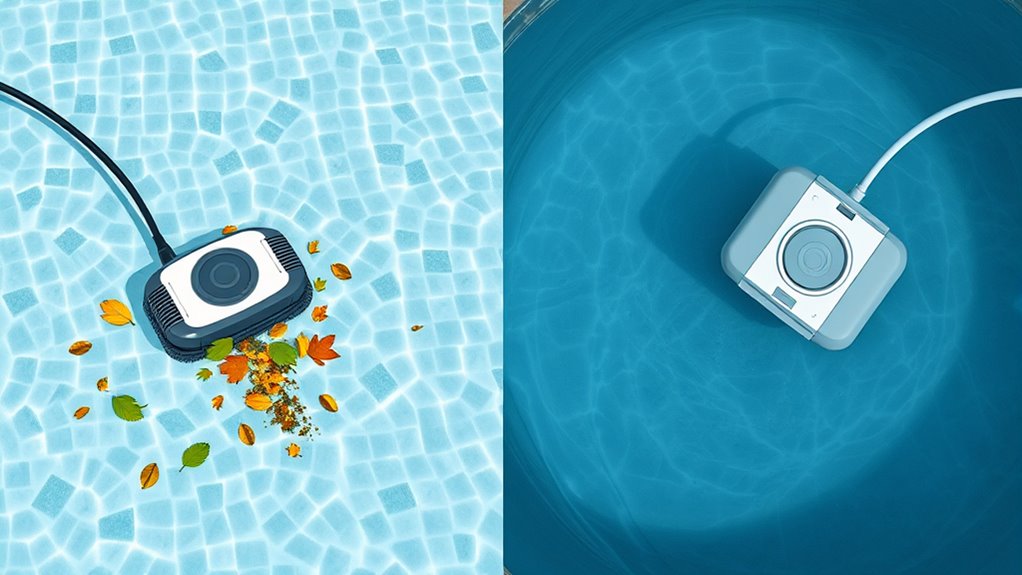
Suction pool cleaners are highly effective at removing a wide range of debris from pool surfaces, thanks to their powerful suction capabilities. They excel at cleaning various pool surface types, including smooth tile, vinyl, and plaster, ensuring thorough debris removal efficiency. These cleaners are particularly good at picking up leaves, dirt, and small particles that settle on different surfaces. Their ability to adapt to different debris sizes and types means you can rely on them for consistent performance. Additionally, filter maintenance plays a crucial role in maintaining their cleaning effectiveness over time. Proper filter care ensures that the suction power remains optimal and prevents clogs that could reduce cleaning efficiency. Regularly checking and cleaning the vacuum seals helps to maintain optimal suction and prevent leaks that can diminish performance. Moreover, understanding the pool surface types can help optimize the cleaner’s performance for different areas of your pool. While some surfaces may require adjustments for best cleaning, suction pool cleaners generally handle a variety of debris with ease. This versatility makes them a practical choice for maintaining cleanliness across different pool surface types, keeping your pool sparkling and debris-free.
Cost and Maintenance Factors for Each Pool Type
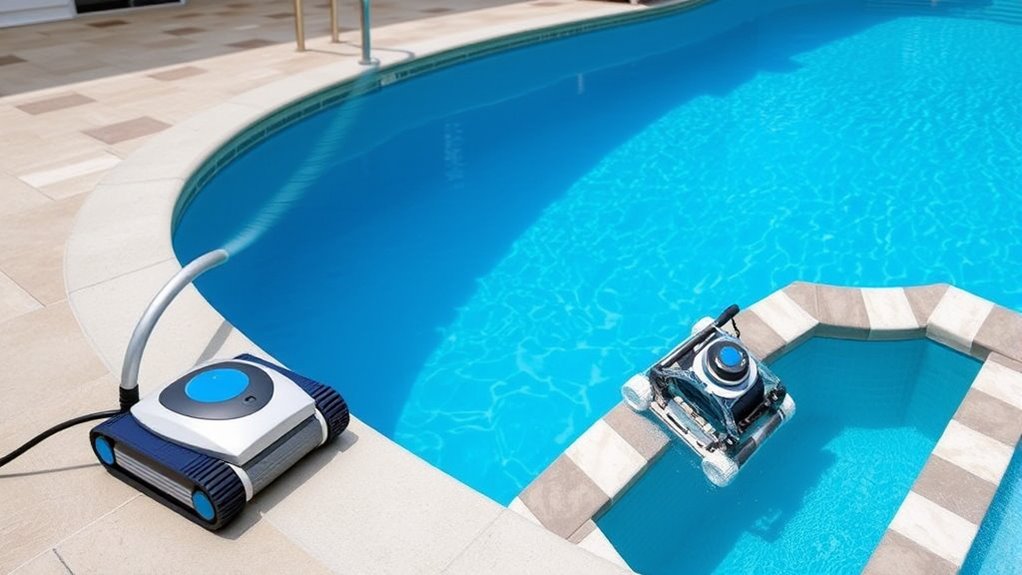
When choosing a suction pool cleaner, it’s important to take into account the initial purchase price and how much you’ll spend on maintenance over time. Different pool types can lead to varying costs for repairs or replacements, which can add up. Understanding these factors helps you plan for the ongoing expenses and ensure your investment is worthwhile.
Initial Purchase Expenses
Purchasing a suction pool cleaner involves considering both the initial cost and ongoing maintenance expenses, which vary depending on your pool type. For above-ground pools, the upfront price is generally lower, making it easier to maintain good pool aesthetics without a hefty investment. In-ground pools typically require a larger initial investment because they often need more durable, specialized equipment. Water chemistry also influences costs; maintaining proper balance can prevent damage to the cleaner and extend its lifespan, reducing replacement expenses. While in-ground systems might cost more initially, they often deliver better cleaning efficiency for larger or more complex pools. Additionally, store hours can impact your ability to purchase supplies and seek support when needed. Keep in mind that the right choice balances upfront expenses with the long-term benefits of maintaining clear water and appealing pool aesthetics, and considering filter technology can optimize cleaning performance and reduce maintenance costs over time.
Ongoing Maintenance Costs
Ongoing maintenance costs for suction pool cleaners vary considerably between pool types, affecting your long-term expenses. In-ground pools often require more energy due to larger surface areas, increasing energy consumption and overall costs. Above-ground pools tend to have lower ongoing expenses because they are smaller and easier to maintain. Here’s a breakdown:
| Pool Type | Energy Consumption | Typical Maintenance Costs |
|---|---|---|
| In-Ground | Higher | $200–$400 annually |
| Above-Ground | Lower | $100–$200 annually |
Choosing the right pool impacts your long-term expenses, especially when considering energy efficiency and routine upkeep. Proper maintenance ensures your suction cleaner remains effective without inflating your costs unnecessarily.
Repair and Replacement Needs
Repair and replacement needs for suction pool cleaners vary considerably between in-ground and above-ground pools, influencing your long-term maintenance costs. In in-ground pools, the pool liner durability is a key factor, as aggressive cleaning can cause wear or tears over time, leading to costly repairs. Additionally, higher suction power levels needed for in-ground pools can strain the cleaner’s components, increasing the likelihood of breakdowns. Conversely, above-ground pools typically experience less strain on their liners, reducing the risk of damage, but their more limited suction power levels may require more frequent repairs or replacements of the cleaner itself. Overall, in-ground pools tend to incur higher repair costs due to liner and component wear, while above-ground pools benefit from simpler maintenance but may need more frequent cleaner replacements.
Ease of Use and Accessibility for Pool Owners
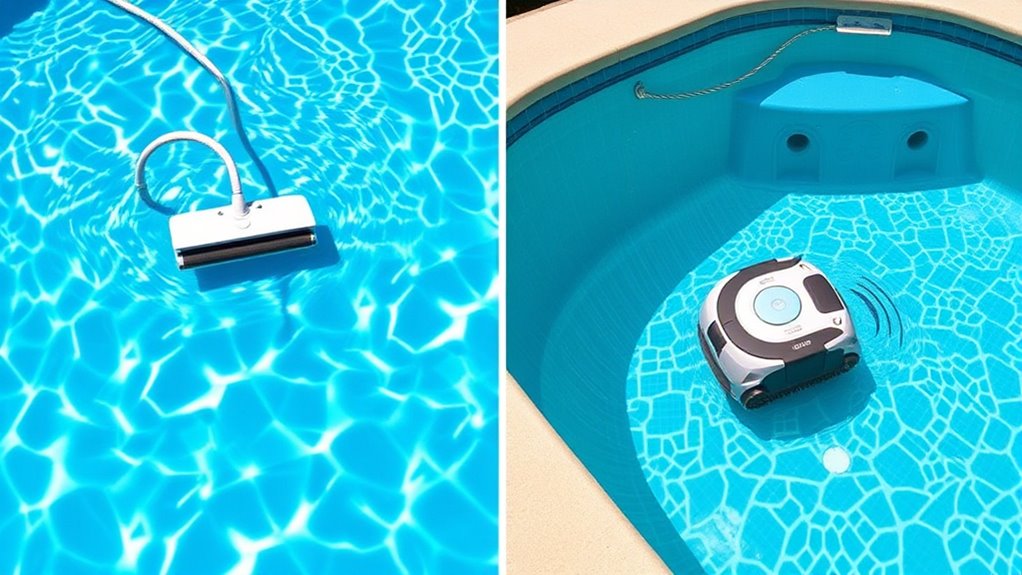
Suction pool cleaners are designed to be straightforward tools that make maintaining your pool easier. They’re generally simple to set up and operate, providing quick access regardless of your pool’s size or shape. For above-ground pools, their lightweight design and minimal setup mean you can start cleaning without hassle, boosting user comfort. In in-ground pools, their ability to adapt to various pool capacities makes them accessible for different pool types and sizes. These cleaners typically require little manual intervention, allowing you to enjoy a more effortless cleaning experience. With features like automatic operation and easy-to-reach components, they help you keep your pool clean without complicated procedures, making regular maintenance more convenient and accessible for every pool owner.
Potential Challenges and Troubleshooting Tips
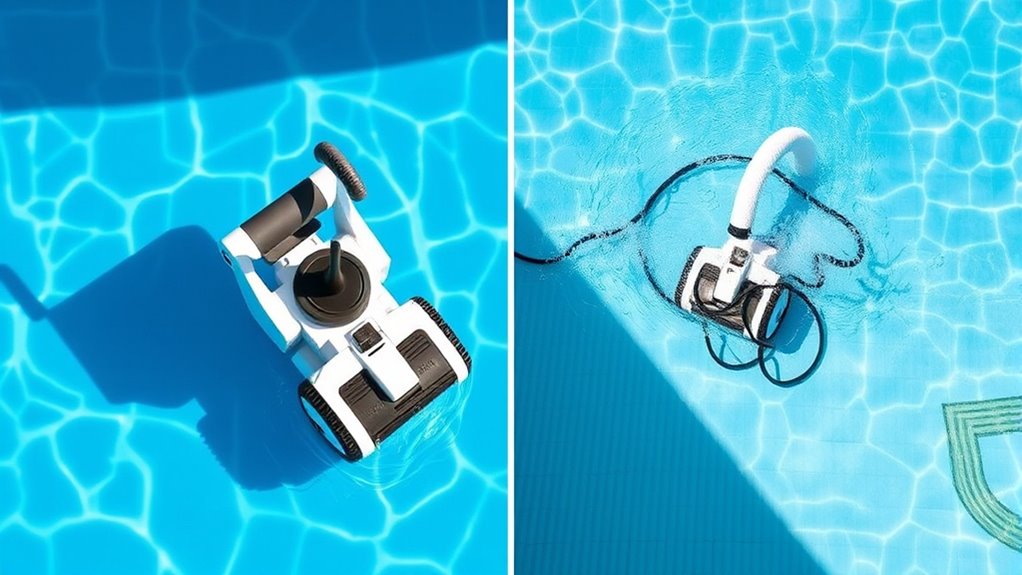
While suction pool cleaners are generally easy to use, you may encounter some common challenges that can disrupt their performance. One issue is filter clogs, which reduce suction power. Regularly check and clean the filter to maintain efficiency. Suction leaks are another problem; inspect hoses and connections for cracks or loose fittings, sealing any leaks promptly. Here’s a quick troubleshooting guide:
| Issue | Solution |
|---|---|
| Filter clogs | Clean or replace the filter regularly |
| Suction leaks | Tighten fittings, replace damaged hoses |
| Reduced suction | Remove debris from skimmer and pump baskets |
| Cleaner not moving | Check for obstructions, ensure proper hose placement |
Addressing these challenges keeps your cleaner running smoothly and prolongs its lifespan.
Making the Best Choice for Your Pool’s Specific Needs
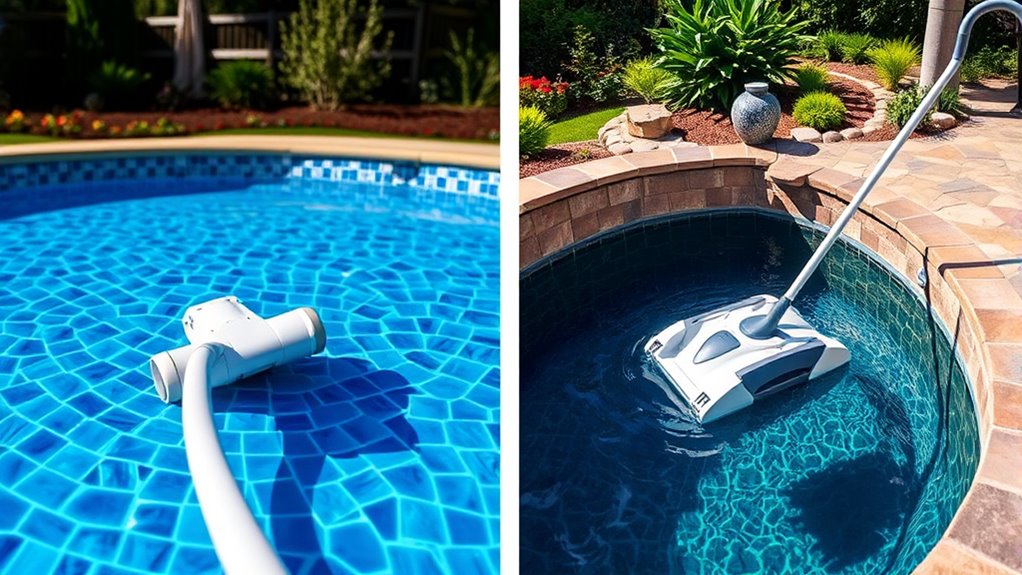
Choosing the right pool cleaner depends on understanding your pool’s specific size, shape, and cleaning needs. For example, larger in-ground pools may require more powerful suction cleaners, while smaller above-ground pools might do well with lightweight options. Consider pool chemical compatibility to guarantee your cleaner withstands regular use of sanitizers and algaecides without damage. If you plan to store your cleaner seasonally, check if it’s easy to disassemble and store in a compact space. Also, think about your pool’s layout—irregular shapes need targeted cleaning tools. By evaluating these factors, you’ll select a suction pool cleaner that fits your pool’s demands, extends its lifespan, and simplifies seasonal storage, making maintenance more efficient and effective.
Frequently Asked Questions
How Long Does It Typically Take to Clean an Above-Ground Versus In-Ground Pool?
The pool cleaning duration varies based on size and debris, but generally, it takes about 1 to 2 hours. Your suction cycle efficiency plays a key role; a well-maintained cleaner completes the task faster. Above-ground pools usually clean quicker due to smaller size, while in-ground pools might take longer. Regular maintenance and proper equipment guarantee efficient cleaning, saving you time and effort regardless of pool type.
Can Suction Pool Cleaners Be Used During Pool Operation or Only When Empty?
You might worry about using suction pool cleaners during pool operation, but they’re designed for it. For effective pool maintenance, these cleaners work while you’re swimming, as long as the equipment is compatible with your pool type. Most suction cleaners don’t require the pool to be empty and can run safely during normal use, making cleaning more convenient without disrupting your swim.
Are There Brand Recommendations Specific to Above-Ground or In-Ground Pools?
When choosing a suction pool cleaner, you should consider brand compatibility with your pool type. Some brands excel with above-ground pools, offering easy installation and compatibility, while others are better suited for in-ground pools. To keep your cleaner working well, follow maintenance tips like regular filter checks and debris removal. Research brands like Zodiac and Hayward, as they’re reliable choices for both pool types and guarantee smooth operation.
How Do Weather Conditions Impact the Efficiency of Suction Cleaners?
Weather effects markedly impact suction cleaners’ efficiency. Storms and heavy rain can cause debris accumulation, overwhelming your cleaner and reducing its effectiveness. Wind can blow leaves and dirt into your pool, requiring more frequent cleaning. Hot, dry weather may decrease debris, but dust can still clog filters. To keep your cleaner working well, regularly remove debris and adjust cleaning schedules based on weather conditions.
What Safety Precautions Should Be Taken When Operating Suction Pool Cleaners?
Think of operating your suction pool cleaner as a dance with safety. You should always prioritize electrical safety by ensuring the power source is grounded and dry. Operator training is essential—know how to handle the equipment properly and recognize hazards. Avoid using the cleaner during storms or when the area is wet. These precautions help you enjoy a clean pool without risking electrical shocks or accidents.
Conclusion
So, whether you’re battling leaves in your grand in-ground oasis or just trying to keep your above-ground splash zone tidy, suction pool cleaners are your trusty sidekicks—if they cooperate. Remember, choosing the right one isn’t rocket science, but it does involve a dash of patience and a sprinkle of troubleshooting. After all, what’s more satisfying than watching your pool sparkle without breaking the bank or your back? Happy cleaning!
